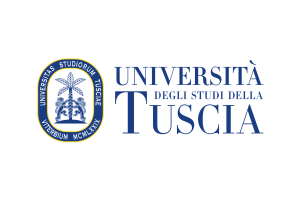Università degli Studi della Tuscia
Università degli Studi della Tuscia (UNITO)
The Tuscia University (UNITUS) is a multidisciplinary public university founded in 1979 in Viterbo. With six departments (three of them ranked as “excellent” by the Italian Ministry of Research and University), eight interdepartmental sand even interuniversity centres, UNITUS offers advanced facilities for cutting-edge research, besides teaching activities.
UNITUS has a long experience in the development and management of industrial research and development projects at both national and international level and has ongoing bilateral agreements with partners across the world. Although being an excellence centre for various disciplines in both Italy and Europe, UNITUS is highly committed in local development and in the production of innovative processes involving both academic research and small to medium-sized enterprises (SMEs). Among the main research scientific fields, UNITUS has always paid attention to the environment (marine, freshwater and terrestrial), climate change, green technologies, new materials, and the circular economy.

The Department of Ecological and Biological Sciences (DEB-UNITUS) has developed research and teaching competences oriented to marine environment. Some labs dedicated to molecular ecology are in the headquarters of Viterbo, but the main infrastructures are hosted at CISMAR, the Ichthyogenic Experimental Marine Centre, located within the Regional Natural Reserve of the Tarquinia Salterns (Northern Latium). Here are the facilities for experimental aquaculture (tanks, labs and instrumentation) and the labs of molecular parasitology and environmental DNA.
Research groups are specialized in the study of marine biodiversity at all organization levels (genes, species, communities and ecosystems), with multidisciplinary and integrated methodologies applied to sustainable aquaculture and seafood under a “one-health” approach. Within this frame, molecular ecology methods are used to investigate marine biodiversity as a resource for fishery, ecosystem functioning and experimental aquaculture, while behavioural and ecophysiological research support the set-up of innovative aquaculture techniques able to produce “high quality” specimens for restocking and guidelines on crustacean and cephalopod welfare. Parasitological and microbiological studies are aimed at finding the relationships between the state of marine ecosystems and parasites/pathogens transmission along the food webs, including humans through seafood.
DOWNLOAD HERE THE FULL PRESENTATION SHEET OF UNITUS:
